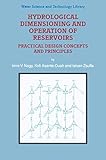Hydrological dimensioning and operation of reservoirs: practical design concepts and principles [Libro electrónico] / Imre V. Nagy, Kofi Asante-Duah, Istvan Zsuffa
Por: Nagy, Imre V [autor/a].
Asante-Duah, Kofi [autor/a] | Zsuffa, Istvan [autor/a].
Tipo de material: Libro
en línea Editor: Dordrecht: Springer science, c2002Descripción: xi, 225 páginas : diagrs., gráf. ; centímetros.ISBN: 9048159423; 9789048159420; 9789401598941 (Online).Nota de acceso: Disponible para usuarios de ECOSUR con su clave de acceso Nota de bibliografía: Incluye bibliografía: páginas 210-219 e índice: páginas 21-225 Número de sistema: 57397Resumen:
Libro
en línea Editor: Dordrecht: Springer science, c2002Descripción: xi, 225 páginas : diagrs., gráf. ; centímetros.ISBN: 9048159423; 9789048159420; 9789401598941 (Online).Nota de acceso: Disponible para usuarios de ECOSUR con su clave de acceso Nota de bibliografía: Incluye bibliografía: páginas 210-219 e índice: páginas 21-225 Número de sistema: 57397Resumen:| Tipo de ítem | Biblioteca actual | Colección | Signatura | Estado | Fecha de vencimiento | Código de barras |
|---|---|---|---|---|---|---|
| Libros | Biblioteca Electrónica Recursos en línea (RE) | Acervo General | Recurso digital | ECO400573976542 |
Incluye bibliografía: páginas 210-219 e índice: páginas 21-225
Disponible para usuarios de ECOSUR con su clave de acceso
Storage reservoirs represent one of the most effective tools for eliminating, or at least for minimizing, discrepancies in the time and space variations of water resources distribution and requirements. In fact, the different - often contradictory - and increasing demands on water resources utilization and control usually can be fulfilled only by building multi-purpose reservoir systems. In this way, the available water resources can be exploited and/or managed in a more rational way. Typically, the construction of a dam across a river valley causes water to accumulate in a reservoir behind the dam; the volume of water accumulated in the reservoir will depend, in part, on the dimensions of the dam. The size of the dam will normally affect the capital expenditure in a very significant way. Indeed the construction of large water resource control systems - such as dams - generally involves rather huge manpower and material outlays. Consequently, the elaboration of effectual methods of approach that can be used in establishing the optimal reservoir parameters is of great practical significance. For instance, in the design and operation oflarge multi-reservoir systems, simple simulation and/or optimization models that can identify potentially cost effective and efficient system design are highly desirable. But it should be recognized that the problem of finding optimal capacities for multi-reservoir systems often becomes computationally complex because of the large number of feasible configurations that usually need to be analyzed." eng
Disponible en línea
Disponible en formato PDF
Subscripción a ELSEVIER 26 de diciembre del 2013
